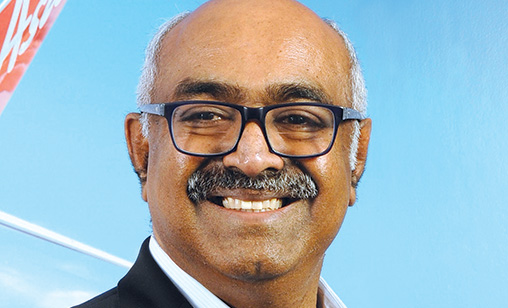Addendum
Global pandemic to increase pain for AirAsia India?
May 1st 2020
Airline analysts, observers and industry executives argue some airlines in India – Air Asia India (AAI) and Go Air in particular - are likely to be shakier than others post the COVID-19 outbreak. Read More »
In 2013, when the joint venture between AirAsia Group’s investment arm, AirAsia Investment Limited, and Tata Group was proposed, it appeared to have all the ingredients for success. The low-fare airline concept – both globally and in India - was a known animal. It had the backing of AirAsia Group co-founder, Tony Fernandes, and the wealth of experience the Malaysian-headquartered LCC company brought with it.
 |
Almost all the systems, protocols and procedures of the parent were adopted for AirAsia India. Oil prices were at a low and were continuing to fall.
For Fernandes, who had steadily expanded his airline group’s presence with joint ventures in Thailand, Indonesia, Japan and Philippines, India was an obvious gap to be filled.
For Tata Group scion, Ratan Tata, an aviation enthusiast, it was a space he’d been looking to enter since 1996.
Yet sometimes the best-laid plans go awry. In the case of AirAsia India, it began with a politician and lawyer in India, Subramanian Swamy, who took to the courts to argue the licence of the joint venture (JV) was invalid. He said the country’s Foreign Direct Investment (FDI) rules allowed investment in “existing” Indian carriers and not the establishment of a new carrier, a matter that has since been resolved.
Additionally, and soon after the LCC’s launch, the JV was accused of violating regulatory laws. Indian FDI rules stipulate both “substantial ownership” and “effective control” [of companies] must rest in Indian hands, a rule ignored by the airline from its first flights, from its Bangalore base, in June 2014.
As early as February 2013, an email written by group legal counsel for Tata Sons, Bharat Vasani, had raised concerns about “effective” control of the JV and potential non-compliance with Indian regulatory laws.
Vasani raised more alarm bells about the JV’s modus operandi by querying the LCC’s aircraft leases rates and related party transactions [at the carrier]. He alleged they were being approved without “reviewing details or verifying commercial terms”.
This situation persisted until November 2018, when Tata was forced to increase its holding in the airline and bring on board its own nominee, Sunil Bhaskaran, to run the airline.
By 2016-2017, the attention of the Central Bureau of Investigation (CBI) and Enforcement Directorate had been drawn to the workings and alleged financial misdoings of AirAsia India.
It was alleged there were many related party transactions and money in excess of commercial terms dictated appearing to be paid to lessors chosen by the AirAsia Group.
The airline also was alleged to be in violation of tax regulations. A demand notice has been issued against the company that is pending.
Secondly, the airline hired agents to help “convince” the government to modify the 5/20 rule that only allowed new carriers in India to enter the overseas market if they had been flying for five years or had a minimum fleet of 20 aircraft.
These “agents” were essentially lobbyists like Deepak Talwar who had been instrumental in influencing government policy through various means that included liberal handouts of bilaterals, a matter also under investigation.
What was worse for the LCC was that Fernandes brought in two underwhelming CEOs. Both of them proved to be less than capable of running a low-fare airline business.
Neither of them had much experience in running airlines nor were they familiar with the Indian environment and its dynamics.
The first CEO was ousted and revealed to be involved in financial wrongdoing at a personal level. The second was found in a compromising situation with a female colleague.
The inexperience of both CEOs was revealed in almost every decision they took or failed to take.
The airline changed its hub even before it started operations. Routes were haphazardly chosen and abruptly suspended. Launch CEO, Mithu Chandliya, announced ambitious expansion plans that failed to materialize.
Losses totted up quickly. Towards the end of 2019, the airline’s auditors revealed reservations about the JV as a going concern because of accumulated losses for the year ended 2018-2019 of Rs 1284 crore against share capital of Rs 534 crore. The company’s current liabilities exceed current assets by Rs 962 crore.
Trouble escalated at the carrier in January when AirAsia Group senior executives, including Fernandes, were summoned by India’s investigative agency, Enforcement Directorate, in connection with the 5/20 rule and other regulatory violations. Fernandes failed to show up.
Many feel the AirAsia India JV venture has been “one long embarrassment” for its Indian partner. Sources have said the Tata Sons board has contemplated shutting down the LCC to protect the conglomerate from reputational and monetary damage.
It was against this backdrop that COVID-19 happened. Whether Tatas decide to continue with this unhappy relationship or wriggle out of it remains to be seen. Answers will be clearer once the skies open up again.